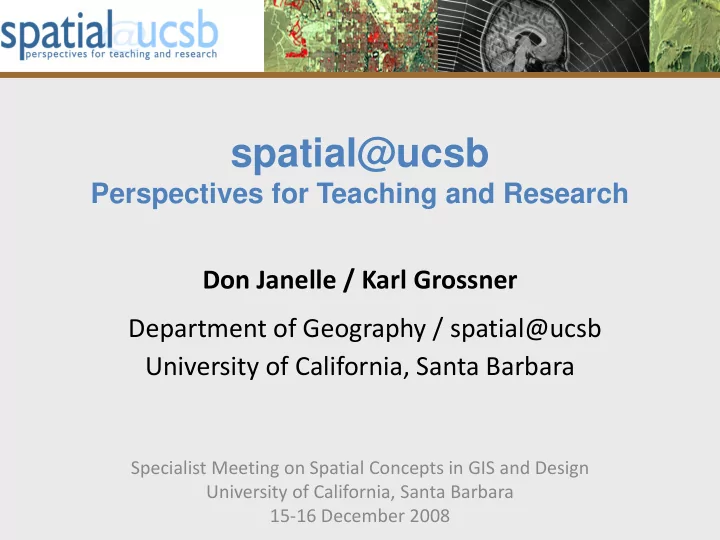

spatial@ucsb Perspectives for Teaching and Research Don Janelle / Karl Grossner Department of Geography / spatial@ucsb University of California, Santa Barbara Specialist Meeting on Spatial Concepts in GIS and Design University of California, Santa Barbara 15 ‐ 16 December 2008
Creative Studies | Humanities & Fine Arts | Social Sciences | Engineering | Education Natural & Biological Sciences | Environmental Sciences & Management Cognition Perception Representation Visualization Computation Modeling Simulation Analysis Application Information-technology Integration Applying Concepts of Spatial Thinking to Describe, Analyze, Understand & Predict, & to Create, Plan & Design . . . Space-time Patterns & Processes
Established 2007 to integrate a campus ‐ wide community of spatial thinkers at UCSB CENTER FOR THE ANALYSIS OF SACRED SPACE Mike Goodchild, director of spatial@ucsb “ spatial@ucsb aims to change what people think of spatial thinking – from something that only experts need to know about, to something that everyone should use.” UCSB is Spatial
A Natural / Structural View on the Space of Knowledge Goodchild & Janelle 12/18/2008 Donald G. Janelle 4
An Empirical / Pragmatic View on the Space of Knowledge Goodchild & Janelle 12/18/2008 Donald G. Janelle 5
Spatial thinking is transformative GIS, Design, & beyond • Value for daily living and for problem solving in society and science •Transcends disciplinary boundaries •Unites quantitative and qualitative thinking •Allies with multi-media graphic display and communication of information •A domain of continuing significant knowledge development • Not necessarily easily and intuitively acquired • Candidate for inclusion in general education
Contrasting but Complementary Perspectives spatial@ucsb Spatial Intelligence Learning Center Focus: Focus: • Spatial concepts in social, • spatial cognition environmental, behavioral, & • understanding spatial learning design sciences • Improve K ‐ 12 education • Curriculum development for practices to foster spatial skills & undergraduate education spatial functioning Methodology: Methodology: • Identify fundamental spatial • Identify basic elements of concepts spatial thinking • Context dependent applications • Controlled experiments to (re: disciplines, theories, measure understanding, problems, policies) learning, & skill development • Tools of spatial analysis (e.g., GIS)
Geo ‐ spatial Concepts for Spatial Reasoning • Location – Understanding formal & informal methods of specifying “where” • Distance – The ability to reason from knowledge of relative position • Network – Understanding the importance of connections • Neighborhood & Region – Drawing inferences from spatial context • Overlays – Inferring spatial associations by comparing mapped variables by locations • Scale – Understanding spatial scale & its significance • Spatial Heterogeneity – The implications of spatial variability • Spatial Dependence – Understanding relationships across space (Tobler’s First Law) • Objects & Fields – Viewing phenomena as continuous in space ‐ time or as discrete
Context Dependence across Disciplines Disciplines claim uniqueness of theories, problems, and areas of application; yet also share fundamental objectives and methodologies • Sciences seek identification and understanding of patterns and processes about the physical world and its phenomena • Social sciences focus on interdependence among people & groups, grounded in place, space, & time and the need to understand patterns & processes of human behavior • Engineering and design sciences focus on problem solving and product development that frequently entails the (re) arrangement of spatial entities and the consequences • Humanities focus on human creativity and aesthetic renderings (stories, visualizations, sounds) that often affirm affinity to sense of place and regional identity, use spatial metaphor, and rely on spatialized languages for communication
Initiatives by spatial@ucsb • Workshop on spatial curriculum (hosted by University of Redlands, coordinated by Diana Sinton, June 2008) • Specialist meeting on Spatial Concepts in GIS and Design (Dec 2008) • TeachSpatial.org (coming soon)
What can be accomplished at UCSB? • Multi ‐ disciplinary Minor in spatial thinking • Emphasis or Specialization in spatial thinking within existing degree programs • Independent Studies (98/99; 198/199) • Introduction to spatial thinking as part of existing courses • General Education Course • Freshman Seminar (Interdisciplinary 94) • Multi ‐ discipline Graduate course (NSF IGERT ?) January 2009 planning meeting (computer science, environmental science, geography, history of art and architecture, mathematics, physics, psychology)
http://sand.spatial.ucsb.edu/teachspatial/
Thank You Please check www.spatial.ucsb.edu for information on applications of spatial thinking
Integrating Concepts for Spatio ‐ temporal Reasoning Scientific and civic applications generally integrate multiple spatial concepts simultaneously to engage general types of spatial reasoning to: • (1) detect changes in the uses of space(s) • (2) measure arrangements and clustering • (3) document patterns over time to infer process • (4) study flows as indicators of spatio ‐ temporal interactions • (5) assess space ‐ time associations to test hypotheses
Questions (from the Redlands workshop) 1 • Why is there interest in a general course on spatial thinking? • Can we define “spatial literacy”? • Who (what disciplines) should teach a course like this? • Objectives ? • What spatial thinking concepts would be covered? • How much should this course be guided by cognitive science ? • What might the syllabus look like? • What online resources support development and delivery? • What are valid and interesting forms of assessment ?
Questions (from the Redlands workshop) 2 • Is there a role within the general education framework for a course on spatial thinking? • Are there institutional impediments ? • Who are the other major players with interest in spatial thinking? • Who might like to be aware of our activities? • What types of funding could support this initiative? • Other unanswered questions ? • Next steps?
Recommend
More recommend